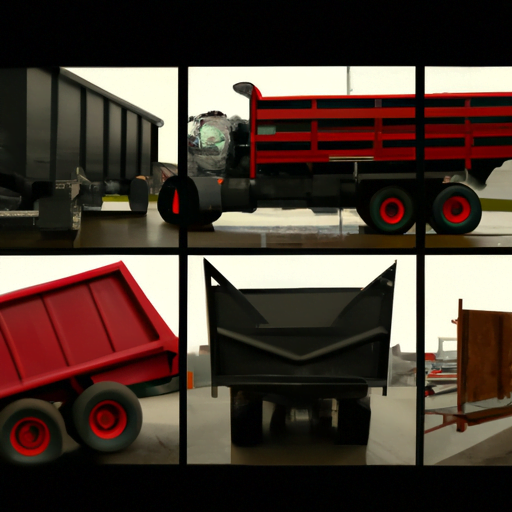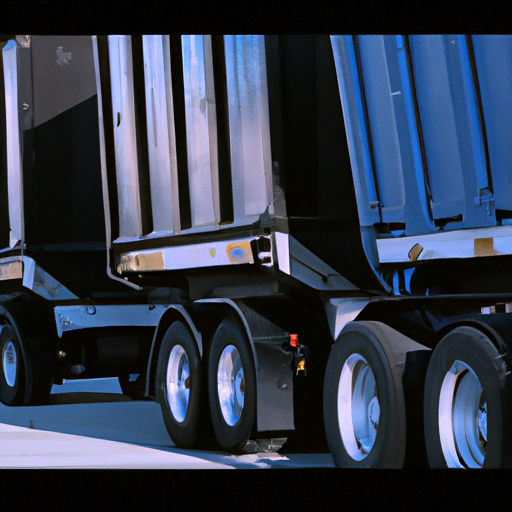-
Table of Contents
Introduction
This paper provides a comparative analysis between dump trailers and other types of trailers. It delves into the unique features, functionalities, and applications of dump trailers, and contrasts them with other trailer types such as flatbed, dry van, refrigerated, and lowboy trailers. The analysis aims to highlight the advantages and disadvantages of each type, their suitability for specific tasks, and the factors influencing the choice between a dump trailer and other trailer types.
Comparative Analysis: Dump Trailers Versus Other Trailers
When it comes to hauling heavy loads, trailers are the go-to solution for many industries. However, not all trailers are created equal. Among the various types available, dump trailers stand out for their unique features and capabilities. In this comparative analysis, we’ll delve into the differences between dump trailers and other types of trailers, highlighting the advantages and potential drawbacks of each.
Starting with the basics, a dump trailer is a specialized type of trailer designed to haul and unload heavy materials such as sand, gravel, or demolition debris. It features a hydraulic lift system that allows the trailer bed to tilt upwards, enabling the contents to be dumped out without manual labor. This feature is a significant advantage over other types of trailers, such as flatbeds or utility trailers, which require manual unloading.
However, the benefits of dump trailers don’t stop at easy unloading. They also offer superior payload capacities. While a standard utility trailer might carry around 2,000 pounds, a dump trailer can handle loads up to 20,000 pounds or more, depending on the model. This makes dump trailers an excellent choice for heavy-duty tasks in construction, landscaping, and similar industries.
On the flip side, other types of trailers have their unique advantages. For instance, flatbed trailers offer unmatched versatility. With no sides or roof, they can accommodate a wide variety of cargo, including oversized or irregularly shaped items that wouldn’t fit in a dump trailer. Similarly, enclosed trailers provide protection from the elements, making them ideal for transporting sensitive goods like electronics or furniture.
When it comes to maneuverability, smaller trailers like utility or enclosed trailers often have the upper hand. Their compact size makes them easier to navigate through tight spaces and city streets. In contrast, the larger size and weight of dump trailers can make them more challenging to maneuver, especially for inexperienced drivers.
Cost is another factor to consider in this comparison. Dump trailers, with their heavy-duty construction and hydraulic systems, tend to be more expensive than other types of trailers. However, the investment can quickly pay off for businesses that frequently haul and unload heavy materials. On the other hand, utility or enclosed trailers, while less capable in terms of payload and unloading ease, are generally more affordable, making them a popular choice for light-duty tasks and personal use.
In conclusion, the choice between a dump trailer and other types of trailers largely depends on your specific needs and budget. If your work involves hauling heavy loads and you need a quick and efficient way to unload, a dump trailer is hard to beat. However, if you require versatility, maneuverability, or protection from the elements, other types of trailers might be a better fit. As always, it’s essential to carefully assess your requirements before making a decision. After all, the right trailer can make a world of difference in your productivity and efficiency.
Understanding the Differences: Dump Trailers and Other Trailers Comparison
When it comes to hauling heavy loads, trailers are the go-to solution for many industries. However, not all trailers are created equal. Among the myriad of options available, dump trailers stand out for their unique features and capabilities. In this comparative analysis, we’ll delve into the differences between dump trailers and other types of trailers, highlighting the unique advantages and potential drawbacks of each.
To start, let’s define what a dump trailer is. Essentially, it’s a large, open-top trailer equipped with a hydraulic system that allows for the easy unloading of materials. This is a stark contrast to other types of trailers, such as flatbeds or enclosed trailers, which require manual labor or additional equipment for unloading. The hydraulic system in a dump trailer can tilt the trailer bed, causing the load to slide out, making it an ideal choice for transporting loose materials like gravel, sand, or waste.
On the other hand, flatbed trailers, another common type, are characterized by a flat, open deck with no sides or roof. This design makes them versatile for carrying a wide range of cargo, from construction materials to heavy machinery. However, unlike dump trailers, unloading flatbed trailers often requires forklifts or cranes, which can be time-consuming and labor-intensive.
Enclosed trailers, meanwhile, offer protection from the elements, making them suitable for transporting goods that need to be kept dry and secure. They are commonly used for moving furniture, appliances, and other household items. However, similar to flatbed trailers, unloading an enclosed trailer can be a laborious process. Moreover, their enclosed design limits the size and shape of the items they can carry.
Now, let’s talk about the advantages of dump trailers. The most significant benefit is their ability to unload cargo quickly and efficiently, saving both time and labor costs. This feature makes them particularly useful in construction and landscaping projects where large amounts of loose materials need to be transported and unloaded. Additionally, dump trailers can handle heavier loads compared to other trailer types, thanks to their robust construction and hydraulic system.
However, dump trailers are not without their drawbacks. Their open-top design means they can’t protect cargo from the elements. Also, they are typically more expensive than other types of trailers due to their specialized hydraulic system.
In contrast, flatbed and enclosed trailers offer more versatility in terms of the variety of cargo they can carry. They are also generally more affordable and easier to maintain, as they lack the complex hydraulic systems found in dump trailers. However, their reliance on additional equipment or manual labor for unloading can be a significant disadvantage in terms of time and labor costs.
In conclusion, the choice between a dump trailer and other types of trailers largely depends on the specific needs of the task at hand. If quick and efficient unloading of loose materials is a priority, a dump trailer is the way to go. However, for transporting a wider variety of cargo, or for goods that need protection from the weather, flatbed or enclosed trailers may be a better choice. As with any decision, understanding the differences and weighing the pros and cons is key to making the right choice.
Dump Trailers vs Other Trailers: A Comprehensive Comparison Study
When it comes to hauling heavy loads, trailers are the go-to solution for many industries. However, not all trailers are created equal. In this comparative analysis, we’ll delve into the differences between dump trailers and other types of trailers, highlighting their unique features, benefits, and potential drawbacks.
Starting with dump trailers, these are specifically designed to transport and unload loose materials such as sand, gravel, or demolition debris. They are equipped with a hydraulic system that allows the trailer bed to tilt upwards, enabling the materials to be dumped out at the delivery site. This feature makes dump trailers an excellent choice for construction, landscaping, and waste management industries.
One of the main advantages of dump trailers is their efficiency. The hydraulic dumping mechanism eliminates the need for manual unloading, saving both time and labor costs. Additionally, dump trailers are typically built with robust materials to withstand the weight and abrasiveness of the materials they carry, making them a durable and long-lasting investment.
However, dump trailers do have their limitations. Their design is not suitable for transporting large, bulky items that cannot be dumped out, such as machinery or vehicles. Moreover, the hydraulic system requires regular maintenance to ensure it remains in good working condition.
On the other hand, we have other types of trailers such as flatbed, enclosed, and utility trailers. Flatbed trailers, as the name suggests, have a flat, open deck with no sides or roof. This design allows for easy loading and unloading of large or irregularly shaped items from all sides. Enclosed trailers offer protection from weather and theft, making them ideal for transporting valuable or sensitive goods. Utility trailers are smaller and more versatile, suitable for a wide range of general-purpose hauling needs.
These other types of trailers offer their own set of advantages. Flatbed trailers provide flexibility in terms of the size and shape of the load they can carry. Enclosed trailers offer security and protection, while utility trailers are easy to maneuver and store due to their compact size.
However, these trailers also come with their own set of drawbacks. Flatbed trailers expose the load to weather elements and potential damage during transit. Enclosed trailers, while offering protection, limit the size and shape of the items that can be transported. Utility trailers, although versatile, may not be suitable for heavy-duty hauling due to their smaller size and lower weight capacity.
In conclusion, the choice between a dump trailer and other types of trailers largely depends on the specific hauling needs. Dump trailers are efficient and durable, making them ideal for transporting loose materials in large quantities. Other trailers, such as flatbed, enclosed, and utility trailers, offer flexibility, protection, and versatility, respectively. Therefore, when choosing a trailer, it’s essential to consider the nature of the load, the frequency of use, and the conditions under which the trailer will be used. By doing so, you can ensure that you select the most suitable trailer for your hauling needs.
Q&A
1. Question: What is the main difference between dump trailers and other types of trailers?
Answer: The main difference is that dump trailers are designed with a mechanism that allows for the automated unloading of materials. Other trailers, such as flatbed or enclosed trailers, require manual unloading.
2. Question: How does the capacity of dump trailers compare to other trailers?
Answer: Dump trailers typically have a larger capacity compared to other types of trailers. They are designed to carry heavy and bulky materials such as gravel, dirt, or demolition debris. Other trailers may have a lower weight capacity and are used for transporting items like vehicles, furniture, or other goods.
3. Question: What are the differences in terms of usage between dump trailers and other trailers?
Answer: Dump trailers are primarily used in construction, landscaping, and other industries that require the transportation and dumping of large amounts of materials. Other trailers, such as utility trailers or equipment trailers, are used for a wider range of purposes, including hauling equipment, transporting goods, or moving personal items.
Conclusion
In conclusion, dump trailers offer unique advantages over other trailers, including their hydraulic lift system for easy unloading, robust construction for heavy-duty tasks, and versatility in transporting various materials. However, they may not be suitable for specific tasks like transporting vehicles or delicate items, where other specialized trailers excel. Therefore, the choice between dump trailers and other trailers should be based on the specific transportation needs and requirements.



59 thoughts on “Dump Trailers vs. Other Trailers: A Comparative Analysis”